
Rabab Abdulhadi
1955-
Rabab Abdulhadi, born in 1955 in Palestine, is an activist and scholar contributing to the struggle for Palestinian self-determination and the well-being of Palestinian women. She was the Director of Political and International Relations at the Middle East Research Center in New York. She helped found the Union of Palestinian Women's Associations in North America during the first Intifada, or Palestinian uprising. At last contact, she was conducting research for the Gender and Sexuality Studies Center, in the Global South Project.
Keywords: reproductive rights, rural women and land reform
Media: Transcript (English), Video, Bibliography, YouTube Video, Name Pronunciation Audio
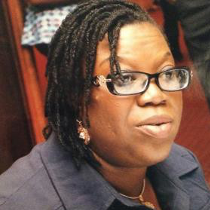
Abiola Akiyode-Afolabi
Abiola Akiyode-Afolabi was born in 1971 in Ilorin, Kwara State Nigeria. Akiyode-Afolabi studied law at the Obafemi Awolowo University. She received her LLM from the Notre Dame School of Law in the US and a PhD from the School of Oriental and African Studies (SOAS), the University of London where she specialized in women’s peace and security studies. In 2002, she established the Women Advocates Research and Documentation Center (WARDC), a not-for-profit focused on maternal and reproductive health advocacy, gender-based violence, and social justice. She also teaches International Humanitarian Law at the University of Lagos. Akiyoda-Afolabi organized grassroot networks connecting women in Nigeria. Such networks have been established in colleges across Nigeria. Read #Womanifesto: What Nigerian Women Want, an important document in Nigerian women’s movement efforts that Akiyode-Afolabi collaborated on, here.
Keywords: academia and women's studies, community activism, environment
Media: Name Pronunciation Audio, Transcript, Video, YouTube Video

Adrienne Asch
1948-2013
Adrienne Asch (1948-2013) was an author and an internationally known bioethicist. At the time of her death, she was director of the Center for Ethics and the Edward and Robin professor of biotethics at Yeshiva University in Manhattan. She was also professor of epidemiology and population health at Yeshiva. Adrienne was a long-time member of the board of directors of the American Society for Bioethics in Humanities and served on the Clinton Task Force on Healthcare Reform and the Ethnical, Legal, and Social Implications Policy Planning Group of the National Human Genome Research Institute. The GFP staff note with sadness Adrienne's death in 2013. Read the NYT obituary to learn more about her pioneering work in disability rights.
Keywords: gender and health, disability rights, reproductive rights
Media: Transcript (English), Video, Bibliography, YouTube Video, Name Pronunciation Audio

Bertha Inés Cabrales
Bertha Inés Cabrales was born in 1943 and joined the Sandinista Front during college and in the late 1970s was sent to Sweden to organize Solidarity events in Europe. She was active in the Luisa Amanda Espinoza Association of Nicaraguan Women and at last contact was head of the Collectivo de Mujeres Itza, an organization that provides sexual and reproductive health counseling as well as legal assistance for victims of gender-based violence.
Keywords: gender and health, media, gender-based violence, reproductive rights, rural women and land reform
Media: Transcript (English, Spanish), Video (English, Spanish), Bibliography, YouTube Video (English, Spanish) Name Pronunciation Audio
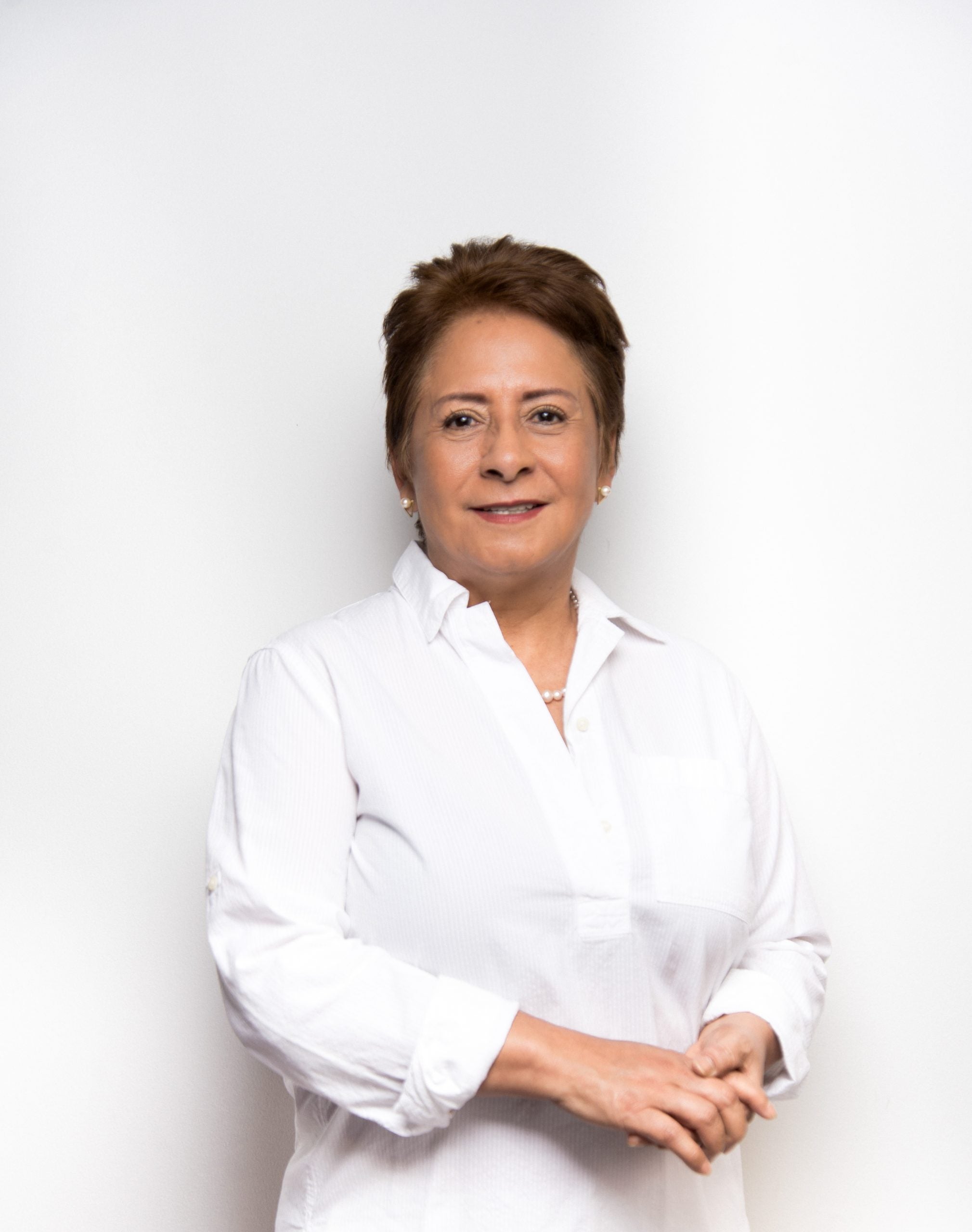
Susana Chavez Alvarado
Susana Chavez Alvarado, born in 1959, has a master’s in Public Health from Cayetano Heredia University. She is an obstetrician graduated from the National University of San Marcos and a specialist in sexual and reproductive health public policy. Susana is a founder, member, President, and Executive director of Promsex, a non-profit organization with a focus on sexual and reproductive rights that reflects a dignity, justice, and equity approach. She is also an executive secretary of the Latin American Consortium against Unsafe Abortion (Consorcio Latinoamericano contra el Aborto Inseguro, CLACAI). She has significant experience in the development of programming and scholarship around sexual and reproductive health and gendered violence. Along with her level of expertise in the field of sexual and reproductive health, Chavez has a particular interest in helping adolescent and child mothers navigate pregnancy. Her work with these adolescent and child mothers includes advocating for abortion rights. Susana is a widely published scholar in the field of Women and Politics Research, Human Rights, and Health Policymaking, collaborating with other researchers in various studies. She has authored, co-authored, and edited several books, including Life Histories of Women Who Experienced An Abortion Because Of Sexual Violence (2015), Stories To Avoid Forgetting: Violence In Relation To Adolescents’ Maternal Mortality, a qualitative study in Peru 2012-2014 (2015), Border spaces: Encounters between social services and health needs of women in La Pampa (2017), and Perceptions About Sexual And Reproductive Rights In Adolescents (2007), among others. Susana has published several studies in academic journals. She has also been an instructor of Health Public Policy with the Institute for Citizenship and Democracy (Instituto Ciudadanía y Democracia).
Keywords: community activism, reproductive rights
Media: Transcript (Spanish, English), Video, YouTube Video (Spanish, English Subtitles), Name Pronunciation Audio

Agnieszka Graff
Agnieszka Graff was born in 1970 and received a bachelor of arts degree in English Language and Literature from Amherst College in the United States and later studied literature at Oxford University. She was an assistant professor of English literature at the University of Warsaw where she translated Virginia Woolf's "A Room of One's Own" in 1997. Since 2000, she has been an assistant professor at the Center for American Studies at the University of Warsaw.
Keywords: art/writing as activism, reproductive rights
Media: Transcript (English, Polish), Video (English, Polish), Bibliography, English YouTube Video, Name Pronunciation Audio
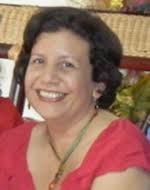
Juanita Jiménez
Juanita Jiménez was born in 1967. She is a lawyer, a leader in the Women's Autonomous Movement, and a longtime activist focusing primarily on women's health and reproductive rights. In recent years, she has become particularly active in protesting the 2006 law that outlawed all forms of abortion in Nicaragua. She has faced political persecution for her work in favor of abortion, and in particular for her support of a 9-year-old girl who had an abortion after being sexually abused.
Keywords: gender-based violence, politics and the law, reproductive rights
Media: Transcript (English, Spanish), Video (English, Spanish), Bibliography, YouTube Video (English, Spanish), Name Pronunciation Audio

Barbara Labuda
Barbara Labuda was born in 1949 and studied Romance languages in Poznan, Poland as well as Ecole Normale Superieure in Paris, France. Labuda became active in anti-communist organizations in the 1970s for which she was imprisoned in 1982. In 1996, she began serving in President Aleksander Kwasniewski's Cabinet. She admits that the anticommunist organizations with which she worked did not support women's rights.
Keywords: imprisonment, politics and the law, reproductive rights
Media: Transcript (English, Polish), Video (English, Polish), Bibliography, English YouTube Video, Name Pronunciation Audio
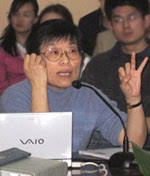
Liu Bohong
Liu Bohong, born in 1951, is Deputy Director of the Institute of Research on Women of the All-China Women's Federation, circulating feminism and promoting gender-awareness in the Chinese government system, notably formulating national programs that implement the 1995 UN Platform for Action.
Keywords: academia and women's studies, education, gender-based violence, politics and the law, reproductive rights, rural women and land reform
Media: Transcript (English, Mandarin), Video (English, Mandarin), Bibliography, YouTube Video (Mandarin, English Dubbed), Name Pronunciation Audio
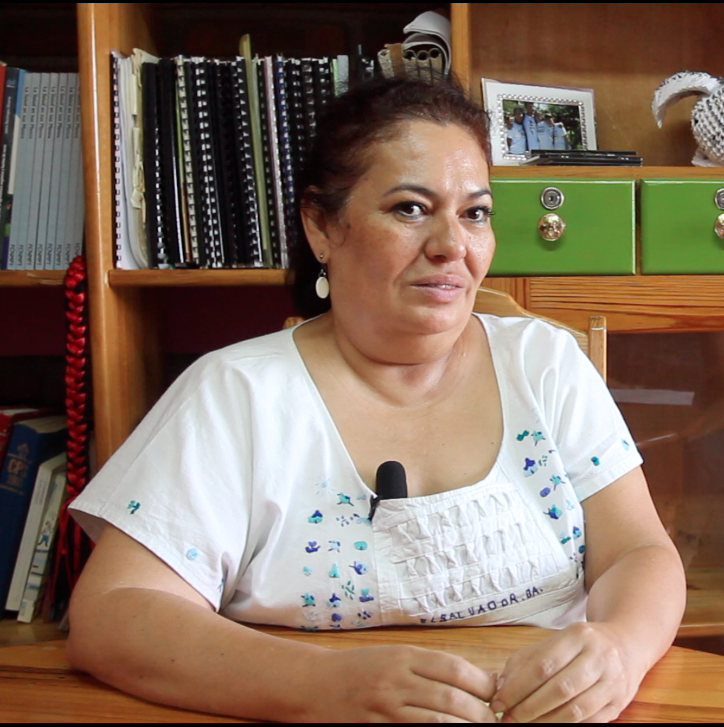
Diana Martínez
Diana Martínez was born in 1958, and became active in the Sandinista movement as a student, finishing high school in Guatemala and becoming a Marxist. After the Sandinista Revolution, she returned to Nicaragua and worked in the textile industry based on her belief in the importance of laborers, and in an effort to rid herself of her bourgeois past. She has been involved with feminist research in Nicaragua, and at last contact was a director at La Fem, a coffee cooperative for women in Estelí.
Keywords: gender and health, rural women and land reform, reproductive rights, academia and women's studies
Media: Transcript (English, Spanish), Video, Name Pronunciation Audio

Yamileth Mejía
Yamileth Mejía was born in 1967, joining the national Literacy Campaign as a girl and receiving her teacher training in Cuba in 1984. She is one of the nine feminists formally accused by the Government of Nicaragua for supporting the rights of an eleven year-old girl who had been raped to obtain an abortion. At last contact, she was working for the Project for Comprehensive Services to Victims of Gender-based Violence funded by the Spanish Cooperation Agency.
Keywords: community activism, education, gender-based violence, reproductive rights, reform of domestic/family roles
Media: Transcript (English, Spanish), Video (English, Spanish), Bibliography, YouTube Video (English, Spanish), Name Pronunciation Audio
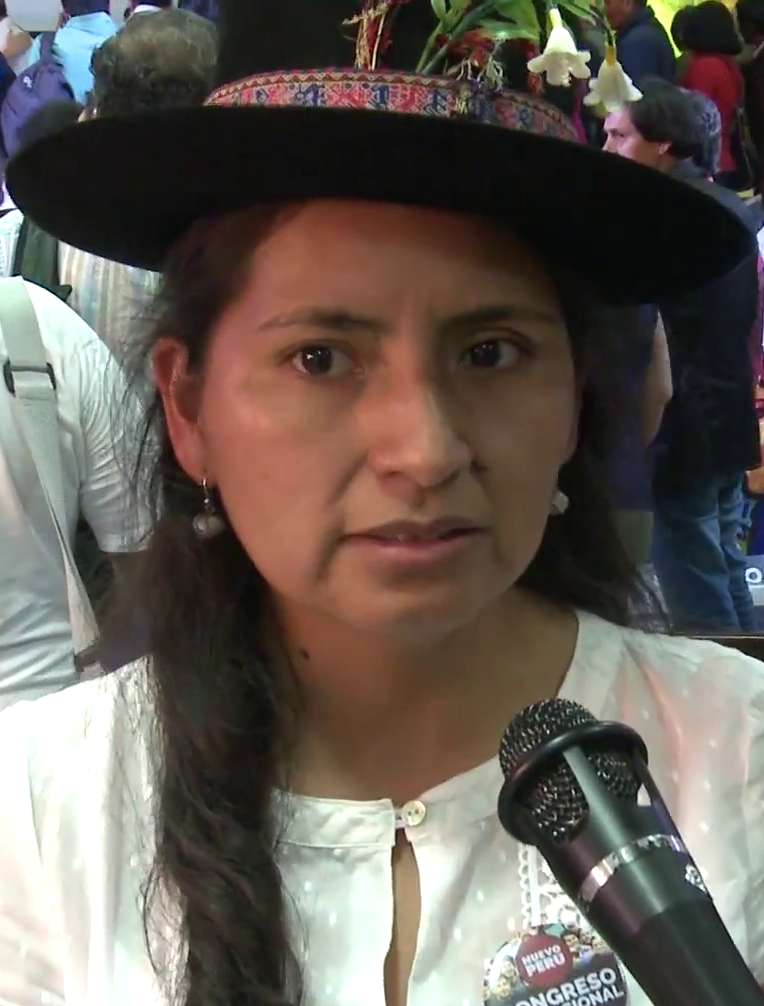
Tania Pariona Tarqui
Tania Pariona Tarqui, born in 1984, is an indigenous activist, Quechua leader, feminist, politician, human rights activist and former Congressperson. As an activist, she works to establish social equality for indigenous youth and women. She began her community work with National Movement of Organized Working Children and Adolescents of Peru (MNNATSOP), an overarching umbrella for many children’s working groups. She was chosen as a Latin American delegate and had her first experience of international representation at age 15 at the “World Summit for Children” at the United Nations in New York. She studied Social Work at the San Cristóbal of Huamanga University, graduating in 2009, and then Human Development at the Pontifical Catholic University of Peru in Lima. She went on to work with the Centre for Indigenous Cultures of Peru (CHRIAPAQ), collaborating on several projects aimed at indigenous youth and women nationally and internationally. In 2010, with Andean and Amazonian sisters, she helped form the Organización Nacional de Mujeres Andinas y Amazónicas de Perú, (ONAMIAP) that promotes the participation of indigenous women and fulfillment of their individual and collective rights. She was the first youth secretary for ONAMIAP. She was elected to the Peruvian Congress in 2016 by the Broad Front for Justice, Life and Freedom, coalition of political parties. In September 2017, she joined the New Peru movement. From 2018-2019, she was the president of the Commission on Women and Family, which promoted the first thematic plenary session focused on a women’s agenda and equality between men and women. Her parliamentary work was dedicated to the defense of the rights of indigenous and native peoples against mining companies, the human right to water and reparations for the victims of the armed conflict, and working against impunity of the perpetrators of crimes, including compulsory sterilization under Alberto Fujimori's government. She is currently assuming responsibility for the Indigenous Women’s Program in CHIRAPAQ and has concerns for the indigenous populations of the Sierra and jungle coast, in the face of the COVID-19 pandemic.
Keywords: community activism, gender-based violence, indigenous issues, reproductive rights, rural women and land reform
Media: Transcript (Spanish, English), Video, YouTube Video (Spanish, English Subtitles), Name Pronunciation Audio
Interviewee Photo Credit
By psperu. https://commons.wikimedia.org/wiki/File:Tania_Pariona_Tarqui.png. Creative Commons. Accessed 2 February, 2021.
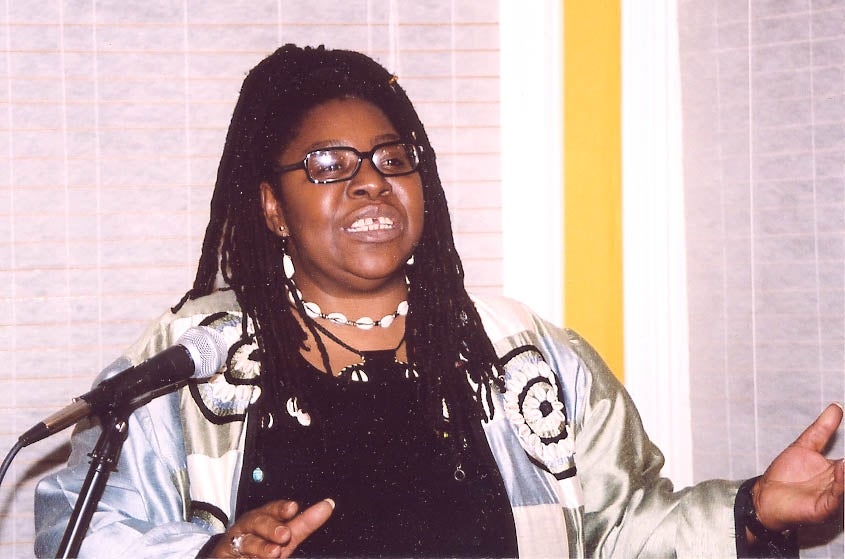
Loretta Ross
Loretta Ross, born in 1953, is an activist and was one of the first African American women to direct a rape crisis center. She has served as director of the Women of Color Programs for the National Organization for Women, as national co-director of the March for Women's Lives in DC, and as National Program Research Director for the Center for Democratic Renewal. She founded the National Center for Human Rights Education and co-authored "Undivided Rights: Women of Color Organizing for Reproductive Justice". She is a founding member and most currently a national coordinator of SisterSong Women of Color Reproductive Health Collective. The New York Times published an article about Loretta Ross on November 19th, 2020, which can be found here. Congratulations to United States GFP interviewee Loretta Ross on being named a 2022 MacArthur Fellow!
Keywords: gender and health, feminist conferences, gender-based violence, intersectionality, reproductive rights
Media: Transcript (English), Video, Bibliography, YouTube Video, Name Pronunciation Audio
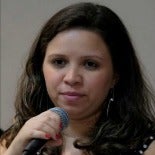
Iara Amora dos Santos
Iara Amora dos Santos, born in 1984 in Fortaleza, Ceará, is a project supervisor at the Center for the Working Woman, an NGO in Rio de Janeiro that supports working class women in understanding their rights. Iara received her B.A. in Law from the Federal University of Rio de Janeiro and has a degree in Women and Human Rights from the Law School at the University of Chile.
Keywords: education, politics and the law, reproductive rights, gender-based violence
Media: Transcript (Portuguese, English), Video, YouTube Video (Portuguese, English Subtitles), Name Pronunciation Audio



